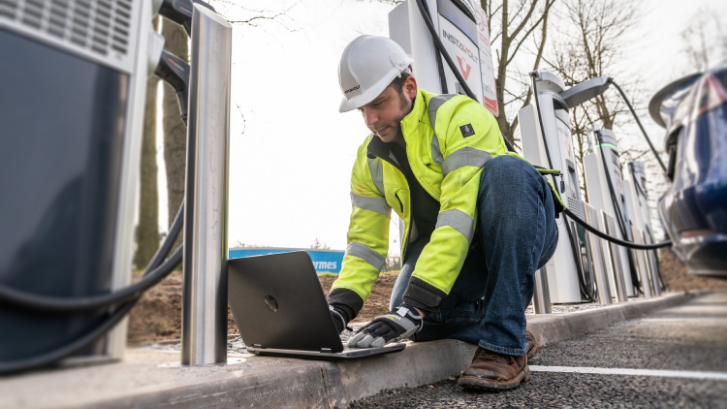Advanced technology
InstaVolt EV chargers deliver high power charging up to 160kW via DC standard connectors.
With InstaVolt EV chargers you’ll be back on the road in no time and with little fuss.
Our management team brings many years of experience in the electrical engineering and energy services sectors.
Backed by global investment organization EQT, the company owns and operates fully public DC fast charging stations.
Our services benefit electric vehicle drivers, the owners of the land that houses the charging units and, ultimately, the environment, by supporting the use of cleaner electric vehicles.

All of the electricity supplied through our chargers comes from renewable energy sources, including solar and wind farms. This means you can be sure you’re doing the best you can for the environment when you top up with InstaVolt.
Sustainability is a key priority for us as a business and we support a number of clean air initiatives.
As a business we are constantly looking at new ways to drive down our own impact on the environment and work with a number of partners to ensure our operations are as sustainable as they can be.
Air quality in our towns and cities is a major talking point up and down the country. The Mayor of London says that around half of all of London’s air pollution comes from road traffic.
Switching to driving an EV can help to reduce this – creating a more welcoming environment for pedestrians and cyclists, as well as improving general health.
In a year, it is estimated that one electric car on the road can save the equivalent of four return flights from London to Barcelona – so just think what a whole nation of them could achieve for our environment.
That’s why we’re on a mission to make driving an EV simple and manageable for everyone.
Transport is one of the main sectors that contribute to polluting gas emissions in Portugal, accounting for 26 % of total emissions in 2019.
Portugal has set a target for GHG emissions to be reduced between 18% and 23% by 2020 and between 30% and 40% by 2030 (2005 baseline). For the transport sector, the goal is to reduce GHG emissions by 14% by 2020 and 26% by 2030 (both 2005 baseline). It also aims to reduce conventional vehicles in cities by 50% by 2030.
Achieving carbon neutrality by 2050 is a priority for Portugal and a Carbon Neutrality Roadmap is currently being developed. The government has been introducing Low (and zero) emission vehicles for public transport fleets and has contributed to the development of MOBI.E – a nationwide program on charging network and interface system. It has passed electric mobility legislation to widen its scope, increase competition and stimulate private charging points.
All of the electricity supplied through our chargers comes from renewable energy sources, including solar and wind farms. This means you can be sure you’re doing the best you can for the environment when you top up with InstaVolt.
Sustainability is a key priority for us as a business and we support a number of clean air initiatives.
As a business we are constantly looking at new ways to drive down our own impact on the environment and work with a number of partners to ensure our operations are as sustainable as they can be.
Air quality in our towns and cities is a major talking point up and down the country. The Mayor of London says that around half of all of London’s air pollution comes from road traffic.
Switching to driving an EV can help to reduce this – creating a more welcoming environment for pedestrians and cyclists, as well as improving general health.
In a year, it is estimated that one electric car on the road can save the equivalent of four return flights from London to Barcelona – so just think what a whole nation of them could achieve for our environment.
That’s why we’re on a mission to make driving an EV simple and manageable for everyone.
Transport is one of the main sectors that contribute to polluting gas emissions in Portugal, accounting for 26 % of total emissions in 2019.
Portugal has set a target for GHG emissions to be reduced between 18% and 23% by 2020 and between 30% and 40% by 2030 (2005 baseline). For the transport sector, the goal is to reduce GHG emissions by 14% by 2020 and 26% by 2030 (both 2005 baseline). It also aims to reduce conventional vehicles in cities by 50% by 2030.
Achieving carbon neutrality by 2050 is a priority for Portugal and a Carbon Neutrality Roadmap is currently being developed. The government has been introducing Low (and zero) emission vehicles for public transport fleets and has contributed to the development of MOBI.E – a nationwide program on charging network and interface system. It has passed electric mobility legislation to widen its scope, increase competition and stimulate private charging points.